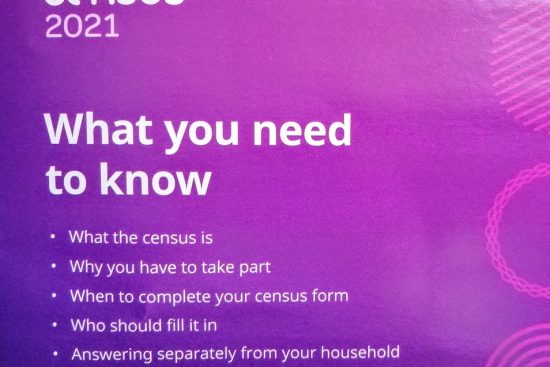This March, people in Wales and England are being asked to complete the national Census, which is essentially a giant questionnaire run by the Office for National Statistics (ONS).
The census survey happens every 10 years and gives a picture of all the people and households in England and Wales (in Northern Ireland, the census is run by the Northern Ireland Statistics Agency and in Scotland it’s the National Records of Scotland).
It is mandatory to complete the census and people can face a fine of up to £1,000 for not taking part.
But it’s not just about avoiding a fine. Taking part in the census is your chance to help make sure you and your community get the services you need for the next 10 years and beyond. Many charities and voluntary organisations use census data in their funding applications as it helps paint a picture of their neighbourhoods and educate funders as to why the projects are needed.
Here’s a handy guide to the census (*information taken from the census webite):
When is the census?
Every household should complete the census on Sunday 21 March 2021 or as soon as possible after.
How long does it take?
The census should take about 10 minutes for the household questions and 10 minutes per person.
Why should I take part in the Census?
Your answers to the census questions will help organisations make decisions on planning and funding public services in your area, including transport, education and healthcare.
But maybe more importantly, you must complete the census by law.
It is an offence to supply false information or to not complete the census, and you could be fined up to £1,000.
Some questions are clearly labelled as voluntary. It is not an offence if you do not answer these.
Who should complete the census?
Everyone in England and Wales must complete a census or be included on a census for the place where they’re living or staying.
Every householder at an address is responsible for completing a census questionnaire for their household. The householder should either answer the individual questions for all household members or make sure each member answers their own.
A householder is a person who usually lives at the address and, on their own or with someone else:
- owns or rents the accommodation, and/or
- pays the household bills and expenses
A household is either:
- one person living alone, or
- a group of people (who do not have to be related) living at the same address who share cooking facilities and share a living room or sitting room or dining area
You need to complete a census if you:
- live in private or rented accommodation
- are a student
- have a second home or empty property
- live somewhere that is mobile, such as a canal boat or motorhome
- live in a care home, armed forces base or similar establishment
- do not live at a fixed address
- live in a refuge
- are in witness protection
You are not responsible for filling in the census if you’re staying in the UK for less than three months. The owner, accommodation manager or householder where you’re staying may ask you some questions so that they can fill in the census about the people staying there.
How to complete the census
This time, because of Covid, the census online and you can complete it once you have received a letter with the household code (click here: https://census.gov.uk/)
Census 2021 is a digital-first census, which means people are encouraged to respond online if they can. You will be able to complete the census using any device, including your mobile phone or tablet.
What if it’s not possible to complete the census online?
If you need help, the Office of National Statistics will have an online help area on their website and offer help by phone, webchat, email, social media or text message.
They are also encouraging people to get help from friends and family to complete their census.
If it’s safe and within government guidelines, ONS will also be opening Census Support Centres to help people fill in their online questionnaire.
What to expect from census field officers
After Census Day, at the end of March and into April, census field officers will be visiting households from which they’ve not received a completed census form. They will encourage people to complete the census and help people to access further help if needed.
Field officers will never need to enter a house.
Field officers will be working in the same way as a postal or food delivery visit. They will be wearing Personal Protective Equipment (PPE) and working in line with government guidance.
Completing the census in Welsh
In Wales, if you’re filling in the online census, there are “Cymraeg” and “English” buttons to switch between languages at any time. You can then see questions and instructions in your language of choice.
If you’re filling in on paper, you can use Welsh and English on the same form if you wish. It doesn’t matter whether you’re using the Welsh or English language version of the form.
In England, you can fill in the census form in Welsh if you prefer, but you will not be sent a Welsh language form.
There are separate census forms in England and Wales. In England, the form is available in English only, and in Wales the form is available in Welsh and English.
What happens to the data gathered?
The personal information you put on your census is only used for statistical purposes. Statistics don’t contain any information that will allow you or anyone you live with to be identified. Personal information includes things like your name, date of birth and address.
Names and dates of birth are asked to help make sure we only count each person once.
Your personal census information cannot be used by government
Only carefully selected and approved staff can see your personal census information. Approved staff use the information for statistical purposes only.
Your personal census information cannot be seen or used by:
- anyone who makes decisions about you or any services that you get
- anyone making decisions about your residency applications or immigration status
- anyone making decisions about individual services, such as taxes and benefits
- anyone wanting to find you or sell you anything – your personal information can’t be sold to third parties
- anyone enforcing the coronavirus (COVID-19) restrictions or from NHS Test and Trace
All ONS systems, staff and suppliers follow strict government standards, and confidentiality is protected by law. It’s a crime for anyone to share personal census information unless required or permitted by law.
For more information about the census, click here: https://census.gov.uk/about-the-census



